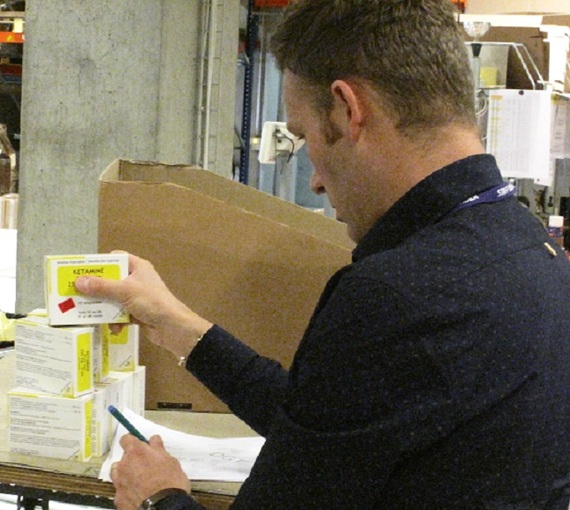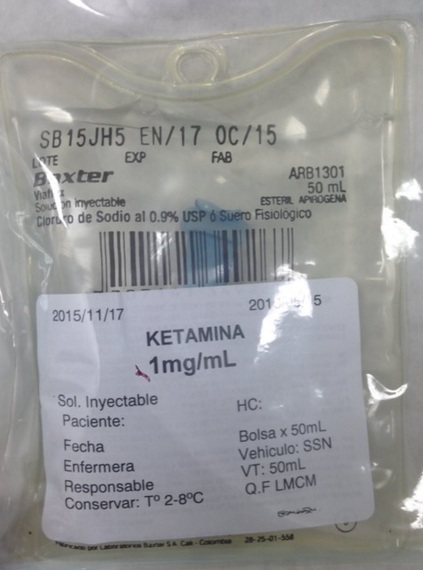"Any level of scheduling poses a risk that supplies of quality ketamine will not be available when it's needed to treat patients in the field."
- Stéphanie Arsac-Janvier, Head Pharmacist at the International Committee of the Red Cross
On Tuesday the World Health Organisation's Expert Committee on Drug Dependence (ECDD) again found that ketamine should not be placed under international control - for the fourth time since 2006. However, the battle is not yet won. This week the deciding Commission (the UN CND) will meet to discuss the issue in Vienna before making a final decision on the issue in March 2016.
Since we began our #KetamineIsMedicine campaign on social media last week, the WFSA has received hundreds of stories about ketamine use in a medical context worldwide. One key focus of these stories has been on conflict and disaster areas.
During natural disasters or wars, relief agencies rely on the anesthetic and pain killer ketamine to save lives. It is one of the first medicines supplied to emergencies. Relief agencies can ship it to emergencies as soon as it's needed, because it's not controlled by international drug schedules.
"It is indispensable for anaesthesia and pain relief in acute and chronic emergencies," says Christophe Perrin, the Pharmaceutical Coordinator of the Médicins Sans Frontières Access Campaign.
"Since January 2013, MSF's European Supply Centres have sent around 200,000 vials of ketamine, to 37 countries, such as Afghanistan, the Central African Republic, Chad, the Democratic Republic of Congo, South Sudan, Syria and Yemen."
It is much more complex for relief agencies to supply medicines containing substances which are on international drug control schedules, than medicines which are not controlled. Controlled medicines, like the essential medicine morphine, for example, are extremely difficult to deliver to emergency zones.
Stéphanie Arsac-Janvier, Head Pharmacist at the International Committee of the Red Cross (ICRC), says it is virtually impossible to supply controlled medicines swiftly to emergencies, regardless of whether they are on the strictest international schedule or the least strict.
"The best case scenario is that it will take weeks to authorize export and import of a controlled medicine," says Ms Arsac-Janvier. "We have had one case where we have been trying to deliver a shipment of the scheduled painkiller pethidine to a conflict zone for a year - and it's still not delivered, because of administrative hold ups."
Scheduling imposes strict controls on medicines
The supply of controlled medicines is subject to strict regulatory requirements, which require authorization from both the importing and exporting countries. Even for experienced relief agencies which ship thousands of tonnes of medicines each year to countries which have poor health care systems, or which have been struck by natural disasters or war, sending controlled substances can be an insurmountable logistical challenge.
Some countries do not have the ability to deliver an import licence, and in those that do, there are frequently administrative problems. Any mistake in the paperwork - a wrong address or medicine name - or the absence of an original version of a form, can lead to delays.
"Any level of scheduling poses a risk that supplies of quality ketamine will not be available when it's needed to treat patients in the field," says Ms Arsac-Janvier.
Delays increase risk of poor quality care
Delays in shipping medicines to a country may mean that they have to be procured locally. In some countries, the required medicine may not be produced locally, available quantities locally may not cover all the needs or quality cannot be easily assured.
"This can mean that physicians have to use substitutes or pharmaceutical formulations that aren't ideal as is already the case currently for medicines on the least restrictive schedule, Schedule IV, of the Convention on Psychotropic Substances," says Christophe Perrin. "There simply is no equivalent for ketamine, though. It's not clear what the substitute would be."
Our 2024 Coverage Needs You
It's Another Trump-Biden Showdown — And We Need Your Help
The Future Of Democracy Is At Stake
Our 2024 Coverage Needs You
Your Loyalty Means The World To Us
As Americans head to the polls in 2024, the very future of our country is at stake. At HuffPost, we believe that a free press is critical to creating well-informed voters. That's why our journalism is free for everyone, even though other newsrooms retreat behind expensive paywalls.
Our journalists will continue to cover the twists and turns during this historic presidential election. With your help, we'll bring you hard-hitting investigations, well-researched analysis and timely takes you can't find elsewhere. Reporting in this current political climate is a responsibility we do not take lightly, and we thank you for your support.
Contribute as little as $2 to keep our news free for all.
Can't afford to donate? Support HuffPost by creating a free account and log in while you read.
The 2024 election is heating up, and women's rights, health care, voting rights, and the very future of democracy are all at stake. Donald Trump will face Joe Biden in the most consequential vote of our time. And HuffPost will be there, covering every twist and turn. America's future hangs in the balance. Would you consider contributing to support our journalism and keep it free for all during this critical season?
HuffPost believes news should be accessible to everyone, regardless of their ability to pay for it. We rely on readers like you to help fund our work. Any contribution you can make — even as little as $2 — goes directly toward supporting the impactful journalism that we will continue to produce this year. Thank you for being part of our story.
Can't afford to donate? Support HuffPost by creating a free account and log in while you read.
It's official: Donald Trump will face Joe Biden this fall in the presidential election. As we face the most consequential presidential election of our time, HuffPost is committed to bringing you up-to-date, accurate news about the 2024 race. While other outlets have retreated behind paywalls, you can trust our news will stay free.
But we can't do it without your help. Reader funding is one of the key ways we support our newsroom. Would you consider making a donation to help fund our news during this critical time? Your contributions are vital to supporting a free press.
Contribute as little as $2 to keep our journalism free and accessible to all.
Can't afford to donate? Support HuffPost by creating a free account and log in while you read.
As Americans head to the polls in 2024, the very future of our country is at stake. At HuffPost, we believe that a free press is critical to creating well-informed voters. That's why our journalism is free for everyone, even though other newsrooms retreat behind expensive paywalls.
Our journalists will continue to cover the twists and turns during this historic presidential election. With your help, we'll bring you hard-hitting investigations, well-researched analysis and timely takes you can't find elsewhere. Reporting in this current political climate is a responsibility we do not take lightly, and we thank you for your support.
Contribute as little as $2 to keep our news free for all.
Can't afford to donate? Support HuffPost by creating a free account and log in while you read.
Dear HuffPost Reader
Thank you for your past contribution to HuffPost. We are sincerely grateful for readers like you who help us ensure that we can keep our journalism free for everyone.
The stakes are high this year, and our 2024 coverage could use continued support. Would you consider becoming a regular HuffPost contributor?
Dear HuffPost Reader
Thank you for your past contribution to HuffPost. We are sincerely grateful for readers like you who help us ensure that we can keep our journalism free for everyone.
The stakes are high this year, and our 2024 coverage could use continued support. If circumstances have changed since you last contributed, we hope you'll consider contributing to HuffPost once more.
Already contributed? Log in to hide these messages.


